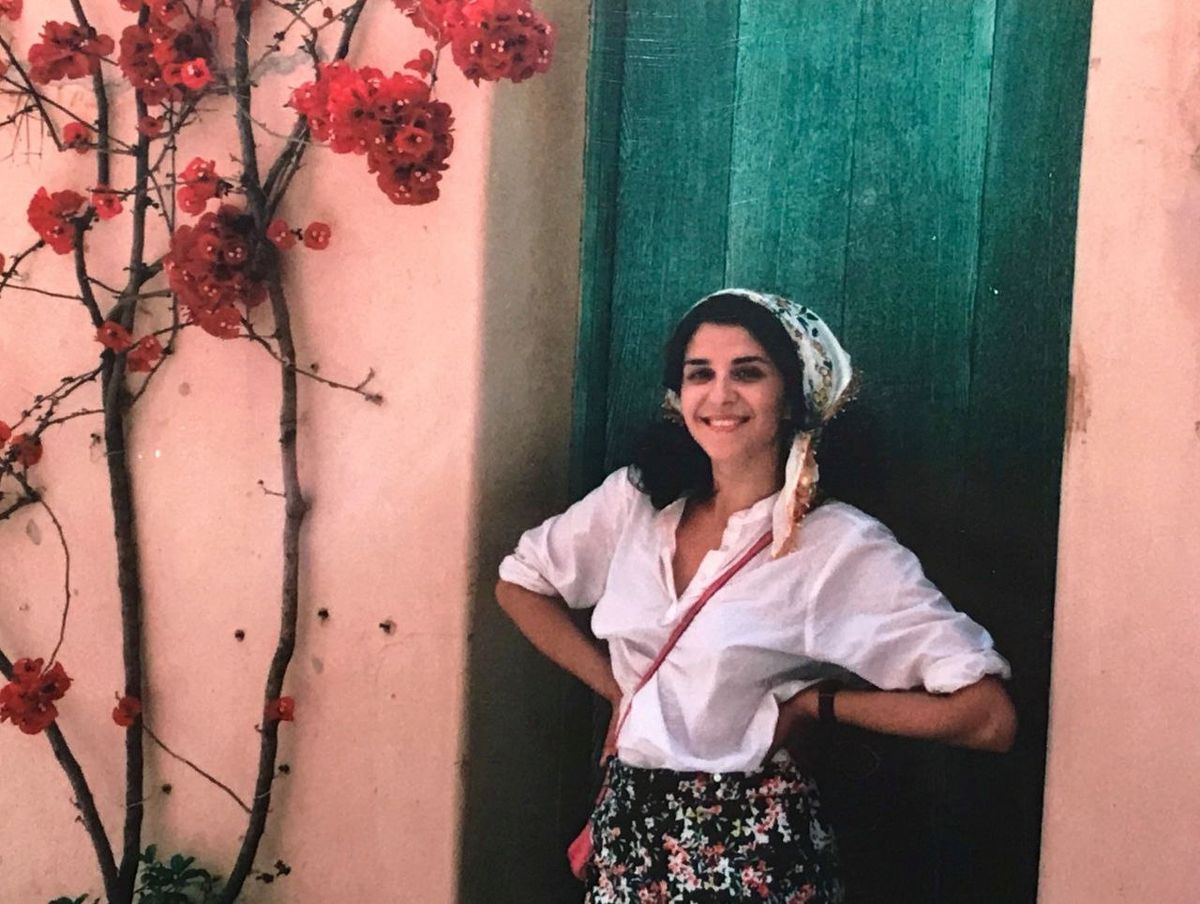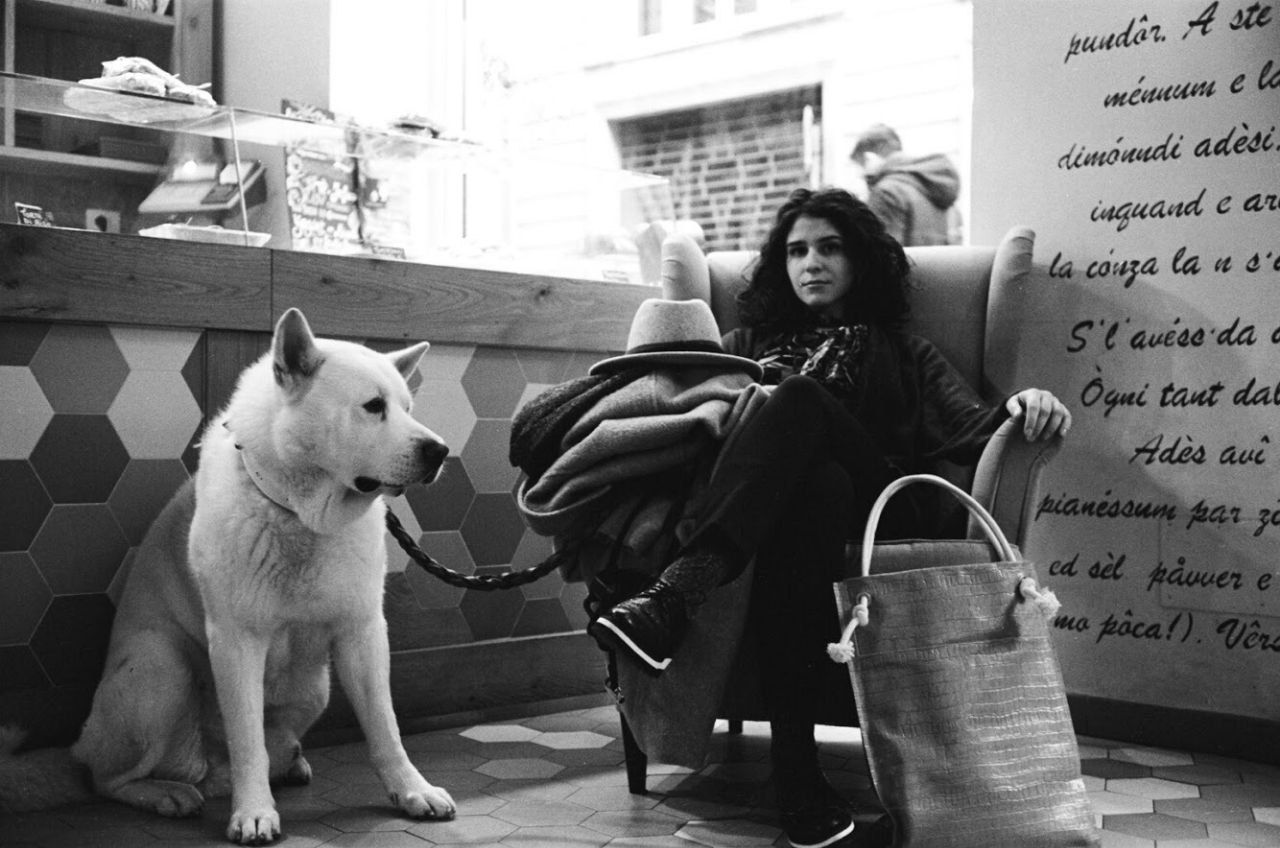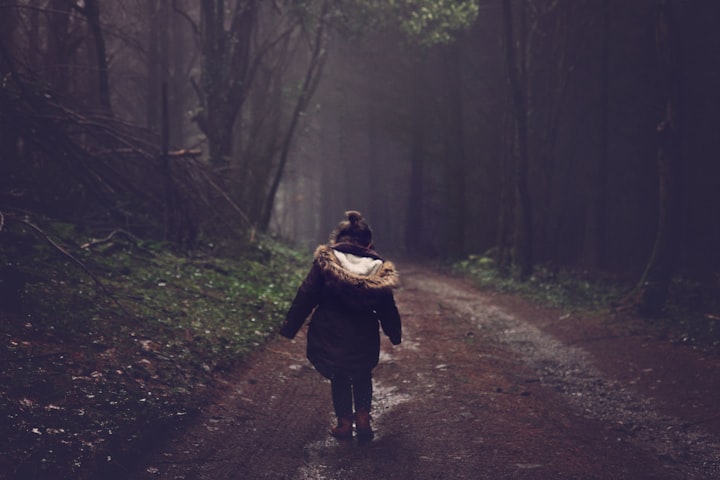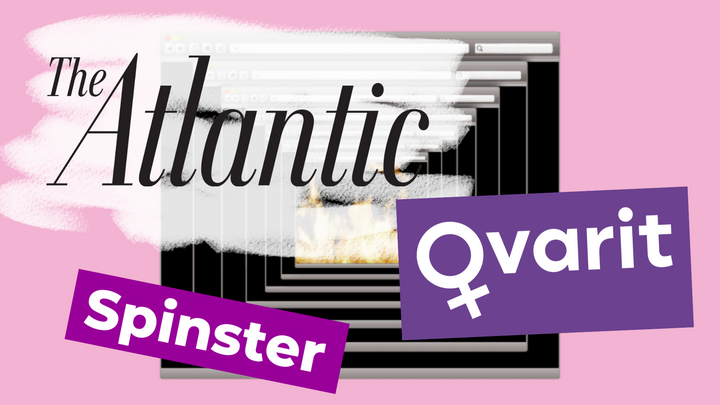Yağmur Uygarkızi on How Reading Fuels Her Feminism
We spoke with the young activist on being a "nerd" and the vital energy of women

Yağmur Uygarkızi is a member of Radical Girlsss living in France and studying political theory. She has eloquently spoken against prostitution at WoLF’s 2020 panel Women Speak. More recently, she has appeared at a 2021 online conference Speak Up for Women’s Rights organized by the Irish Women’s Lobby. Beside the abolition of prostitution, Yağmur has written about the issue of veiling and about queer theory. Her essay “Feminism Allowed You to Speak”: Reinforcing Intergenerational Feminist Solidarity Against Sophisticated Attacks will be published in the upcoming anthology "Spinning and Weaving: Radical Feminism for the 21st Century."
Dana Vitalosova: What’s your age and what do you do?
Yağmur Uygarkızi: I’m 24 and I’m doing an MA in political theory. I’ve done most of my studies in the UK, but last December I came back to France. I don’t even know when I’ll be allowed to go to the UK after the pandemic ends.
What about your feminist work?
I’m a member of Radical Girlsss and I’ve also worked with a bunch of French abolitionist organisations. During the last women’s day, I went to the infamous anti-prostitution demonstration in Paris with my mother, where the queer activists threw eggs at us.
How did it go?
I laugh a bit when I hear how horrified people are and say that we were attacked. Of course, we were, but it wasn’t scary at all. You should have seen the queer activists – they were younger than me – they reminded me of myself in secondary school. Back then, I would have also sympathized with them. Luckily, that was a very short period of my life.
How did your mother find the Women’s day protests?
At one point, the queer activists brought out a banner protesting Islamophobia and my mother went wild. She ran at them and started shouting stuff like: “In Islam, you marry girls when they’re seven! I’m Muslim and this is stupid! What are you protesting against?!” And because the protesters were cowards, they put very young veiled women in front, holding the banner while the men hid behind them. And my mom didn’t want the young women to get scared, she tried to get to the men, but it was too late. Angry older mothers scare everyone (laughs). And when the protesters tried to climb up on a statue, she said “you get down from there” and they instantly obeyed her!
That’s the power of older women!
Yes, I have many older women-friends and it’s been life-saving! It’s very reassuring to talk to someone who’s gone through all that pain.
Talking about age: I saw your speech for the Irish Women’s Lobby a few weeks ago and I was stunned. It is rare to see a young woman who is radical, courageous, self-confident and well-read at the same time! How did you get that way?
I guess it’s always a very personal trajectory, and I don’t want to get into details right now. I think one has to get to see men in their natural habitat and understand that they’re no good. We were actually talking about this within a little consciousness raising group we have here: how does a woman become a feminist? Because we’ve all experienced male violence, but how do we make sense out of it: explain it and put it into context?
Yes, how?
I don’t know. I used to get angry at women who thanked me when I stood up for us against some obnoxious men, saying stuff like: “I’m so glad you did that, because I couldn’t.” I wasn’t happy they left me alone to deal with it. But my 70-year-old friend once told me: don’t be angry at them, just be thankful that you’re not that crushed! I guess some of us are like fish that they didn’t manage to catch, somehow we made our way through the net.
Any theory on how you managed to escape the net?
When I was a teenager I used to hang out with boys a lot, in a “not like the other girls” way. And I saw how they talked about other girls and women. It’s really disgusting. So I know how men think about women.
Some women who pretend to be men now (“trans men”) have also been “tomboys” once and at some point they became persuaded it’s due to their different “gender identity.” How come you went a different way?
I think it’s a question of timing. This “trans thing” really took off when I was 18. When I was a teen, there wasn’t even sexting. At 17-18, I was already over the sensitive period.
Another thing I found quite unusual about you is how well-read you are. You obviously read a lot, you quote from great books in your speeches, and you write well. You’re a great philosopher. Why do you think that is?
Thank you! I’ve always been a bit of a “nerd,” I was a good pupil. It’s also a Turkish thing – you have to be great at everything you do! (laughs). But, most of all, books really really saved me and I was lucky to have access to a good library.
Do you remember your first feminist book?
It was Naomi Wolf’s "The Beauty Myth".
Mine as well!
Really? I was seventeen at the time when I read it and it was very soothing for me. How was it for you?
I bumped into it by chance when I was about 21 years old and I became infuriated. But as this happened before the big wave of social media-feminism, I didn’t have anyone to back me up and offer some kind of outlet for my anger. So I felt like I had to let it go.
I see. Apart from "The Beauty Myth," another life-changing moment for me was writing a project for my high-school ending exam with my classmates. We chose the topic of prostitution – we wished to find out whether it was a choice or not. This way, I discovered things that I couldn’t “unknow.” When people say feminism is like cancer, they’re partly right: once you have it, it’s forever (laughs).

What did you conclude in the project?
Obviously, that prostitution is not a choice, not a freedom. So, after this project, the topic of prostitution, including pornography, became the most infuriating of all for me. And once I started to read feminist books I discovered in the library, I kept reading them mostly because all the rest was so boring!
You mean the rest of the books?
I used to have this quote of Valerie Solanas plastered on my wall: “Life in this society being at best an utter bore and no aspect of the society being at all relevant to women…” But, yeah, I mean mostly the male theory, all of it being so boring! And I believe we as women want to be intellectually challenged, everybody wants that. We love thinking, I think (laughs).
So because of feminism you’ve found the motivation to read even these boring males, right?
Yes, I find it easier to start with feminist criticism and then to read the male theory, because then I know exactly what I’m looking for. But at school, either high school or university, I’ve never heard a teacher say: read feminist theory first. If they did, they could make even the boring male theory more relevant to us.
But, in your speech, you also say we shouldn’t just criticize.
Yes! I believe we waste a lot of time reacting to male theories while we could devote that energy to creating our own thing. I like the term Antoinette Fouque came up with - “feminology:” she means not just doing feminism, but creating our own studies, our own culture, our own thinking. As Susan Griffin used to say: the rebel is always attached to what she rebels against. Similar thing with the term “revolution:” Robin Morgan said that it is a wheel that spins on the backs of women.
Any idea what terms we could use instead of rebellion or revolution?
Robin Morgan talks about transformation, but it has “trans” in it, so I guess that’s out of the question (laughs).
Ugh, yeah (laughs).
I don’t know, actually. I think it would be great if we thought about this collectively, as women. Because, we’re so creative. We have this vital energy. That’s also why I prefer to talk about parasitism instead of oppression – to see men as parasitizing on our vital energy. By the way, this is why men commit suicide after they’ve killed their wife: they’re so stupid that they’ve just killed their only energy source. What were we talking about?
Our vital energy.
Yes, it’s so awesome to see how a woman revives after she gets rid of a violent man. It’s a real renaissance.
Going back to the issue of book-reading, what do you think’s the reason that young feminists don’t read much?
I’m sure one of the reasons is social media, which has inevitably reduced all of our attention spans, mine included. I can’t focus on books as I once used to. But another reason is that many vitally important second-wave feminist books are not being reprinted, you won’t find them in a bookshop, won’t accidentally bump into Andrea Dworkin.
You’ll bump into Judith Butler.
Yes, or other queer theory. Another thing that drives me nuts is that when you go to a bookshop, the feminist books you’ll find are under Sociology. They should be under politics! When they’re under Sociology, it’s because people still view the oppression of women as a societal problem that you observe and study. And then, in the politics section, you’ll only find books about governmental, male politics.
Any other hypotheses why many young women don’t read books?
It’s also a matter of socialization. If there are no books at your house when you grow up, it’s harder to get into it. Another thing is female socialization.
We are discouraged from being smart, right?
This is very important and I feel that even in the radical feminist movement we shy away from intellectuality.
Yes, exactly.
I hear women criticizing other radical feminists all the time for being “too academic,” or something similar. And often, we devalue our own intellectuality, such as when we emphasize that we’re speaking from our experience, that we’re not “intellectuals.” What’s wrong with thinking and creating meaning out of our own experience?
Seeing that we will face consequences when we dare to show we’re smart, what do you think we can do to overcome the fear?
That’s a great question. One thing we can do is read smart feminist women’s texts, for example books from the second wave, which can encourage us. That way, we will also make sure we are not “reinventing the wheel.” But we also have to realize that women’s lives are something that’s deeply understudied. There exists a fancy term called “epistemic injustice” that describes the phenomenon of non-existent words for important common experiences of oppressed groups. It’s vitally important we come up with those words.
Could you give me an example?
In my speech on prostitution and pornography, I talked about dehumanization. (Manifesting in particular in putting male excretions - sperm, saliva, urine, feces, on women in pornography). That was a mistake. I should have talked about de-womanization, because the goal is to crush women. So we have to realize there’s still a lot that we don’t understand, and when we find words for various phenomena, we can grasp them, cease being afraid of them and start to control them. And we should also realize that we want to learn new things. I mean, what’s more important in life than having good relationships, good talks and eating well? (laughs)
Right! One thing Mary Daly used to say is that we’re starved, as women, for real knowledge, real meaning. And that one of the ways this starvation happens is by over stimulation – with pseudo information, pseudo-meaning, toxic knowledge.
Totally. For my political science studies, I had to read scholarly articles by men as required reading. They weren’t in any way related to feminism, but in one of them, the guy was saying that prostitution is a victimless crime. Another one claimed that Hugh Hefner was a philanthropist. Another wrote that “sugar dating” is mutually exploitative, and another that when people don’t want to have kids, we could establish “national pornshops,” so people would get “encouraged” to mate.
Ridiculous. What were those articles about?
One was about racial injustice, one about equality, so really stuff where you wouldn’t expect to find such statements. I think that’s one of the representations of what men do – they sting you, like with a needle, when you least expect it.
Great metaphor! They inject us with toxic information. I think we’re so used to getting bad stuff in life, that we stop wanting the good stuff. Including knowledge and information.
That actually made my heart sink, what you said. I think it’s true also for myself! I mean, I feel guilty when I feel fine! It’s horrible. We don’t want the good stuff because we feel we’re not allowed, that we don’t deserve it… that we’re not good. Something that struck me when I read a book by Primo Levi who survived a nazi concentration camp was that he calls himself “privileged.” Privileged to have escaped. I think this is something we as women share – we shouldn’t call ourselves privileged just because we’re not being raped every day!
Any idea how we can exorcise the guilt we have as women?
One thing I know doesn’t work, is trying to escape patriarchy. We won’t escape it by living alone, by being a lesbian... we can minimize the impact, but we won’t run away. And I feel like some of us believe we will deal with it by adopting labels, such as the label of “feminist.”
Talking about what doesn’t work, what do you think would work?
It took me a while to understand the point about happiness. I first heard it from Sodfa Daaji from Radical Girlsss two years ago and thought ‘What is she going on about? We have so many problems!’. But then recently I heard another woman from the European Network of Migrant Woman, Fatima Kodzoeva who said something beautiful: ‘Women came to this world to be happy’ and simultaneously I saw a post on our Facebook page that said men hate it when we’re happy, they’re doing all they can to stop us from being happy. I reconnected that with all the times we in the Network were reprimanded for the way we talked about certain topics. People would agree with the content but not the form because we were laughing at men and ridiculing their politics. All of this male violence is there to crush our vital energy (or gynergy rather!!), our happiness, our laughter. We need to laugh at men, they hate being ridiculed.
The generous support of our readers allows 4W to pay our all-female staff and over 50 writers across the globe for original articles and reporting you can’t find anywhere else. Like our work? Become a monthly donor!
Enter your email below to sign in or become a 4W member and join the conversation.
(Already did this? Try refreshing the page!)





Comments